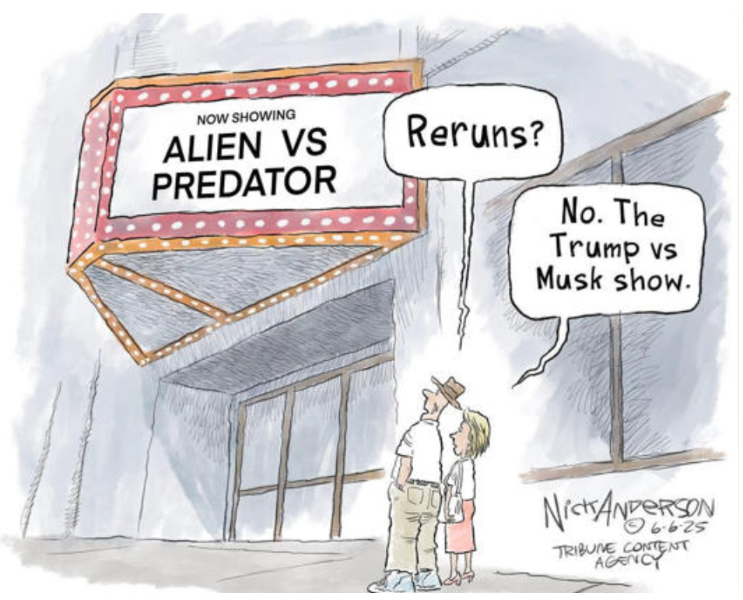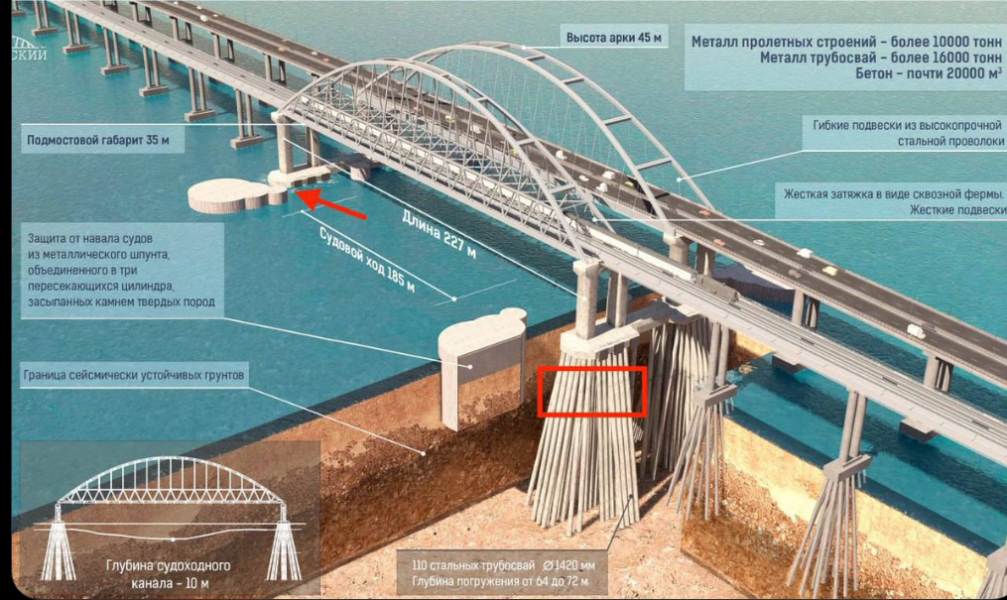
LosLobo
Advanced Member-
Posts
3,854 -
Joined
-
Last visited
Content Type
Events
Forums
Downloads
Quizzes
Gallery
Blogs
Everything posted by LosLobo
-
Seems like someone might be having a 'deranged-fantasy’....... US official tells Fox: the 700 Marines ordered to help in LA have not yet arrived to help control the riots. The Marines will remain at Seal Beach south of Los Angeles and will be undergoing training for a few more days, despite Defense Secretary Hegseth telling lawmakers today that the Marines were trained and ready. "The Marine unit is an infantry unit and needs to learn protocols for use of force in a domestic setting," a U.S. defense official tells Fox News. Earlier this morning Defense Secretary Pete Hegseth said all the military units on the ground have been fully trained for what will likely be domestic riot control. HEGSETH to House Defense Appropriations Committee: “As far as training all of the units on the ground have been fully trained in their capabilities of what they're executing on the ground. Jennifer Griffin Chief National Security Correspondent for Fox News https://x.com/JenGriffinFNC/status/1932509539875631593
-
No one has done more to divide America than Donald Trump—the greatest fomenter of hate between Americans since the days of Robert E. Lee. Trump’s D-Day stunt in L.A. was just a warm-up. On his birthday this Saturday, Trump hijacks a modest Army observance and turns it into his hero Putin’s Kremlin-style military pageantry: 6,500 troops, 150+ armored vehicles, 50+ military aircraft, 175 magnetometers, and 18 miles of fencing—expecting 200,000 attendees, with dissenters pushed to the sidelines. Meanwhile, elsewhere, No Kings—a grassroots revolt against authoritarianism—rises in peaceful defiance, with nearly 2,000 protests planned across the country. Get out the popcorn—1935 Nuremberg Rally meets First Amendment. https://abcnews.go.com/WNT/video/trump-warns-plan-protest-parade-celebrating-us-army-122713736
-
Obama legally deported 3.2 million undocumented immigrants—quietly, without cruelty, violence, or turning it into a media circus. Trump’s LA raids, on the other hand, have involved Marines, flash-bangs, mass arrests, and wall-to-wall news coverage since June 6, 2025. It’s hard not to see it as a planned distraction from: • His messy breakup with Musk and renewed accusations of being Epstein’s wingman • Mounting criticism over the Big Ugly Bill • His failure to deliver peace in Ukraine on day one • A missed 90-day deadline for tariff deals—UK only signed a MOU. • Xi tightening his grip on rare earths while outplaying him on trade • Rising living costs and recession warnings tied to his tariff policies Take your pick.
-
Trump's crackdown on LA protests is pure hypocrisy
LosLobo replied to TheAppletons's topic in Political Soapbox
-
Trump's crackdown on LA protests is pure hypocrisy
LosLobo replied to TheAppletons's topic in Political Soapbox
Brandolini’s Law: It takes ten times more effort to refute BS than for you to crank it out—and frankly, you’re not worth the effort. Enjoy your fact-free trolling—I’m not biting. -
Trump's crackdown on LA protests is pure hypocrisy
LosLobo replied to TheAppletons's topic in Political Soapbox
Try Norway, Grigoryevich! Classic straw man right out of the gate—equating the entire ideology of socialism with Stalinist show trials and Maoist purges is like claiming all Christianity is murderous because of the Spanish Inquisition. Norway’s “murderous socialism,” by the numbers: Metric Norway US Life expectancy 83.1 yrs 79.3 yrs Homicide rate 0.5 / 100 k 6.8 / 100 k Income inequality (Gini) 25 41.8 Happiness rank #7 #24 Childhood poverty rate 8.1 % 20.8 % No hate squads, no forced equality—just universal healthcare, tuition-free universities, Norway’s resource wealth shared by the people (not just the oligarchs) and a murder rate 13× lower than America’s. So, if “socialism can’t exist without violence,” Norway must be doing it wrong—violently outperforming the US on almost every quality-of-life metric. -
Trump's crackdown on LA protests is pure hypocrisy
LosLobo replied to TheAppletons's topic in Political Soapbox
Great—then Newsom can just announce a 2028 presidential run and enjoy the same immunity the current felon-in-chief used to dodge jail. -
Musk calls Trump’s big tax break bill a ‘disgusting abomination'
LosLobo replied to BLMFem's topic in Political Soapbox
-
Here are the real numbers, stripped of marketing gloss: Depreciation – An MG ZS electric crossover loses about 50 % of its purchase price in less than three years, roughly 475,000 baht. Solar setup cost – A 5-kilowatt rooftop array costs around 150,000 – 200,000 baht; any “free” electricity only shows up after 5 – 7 years of pay-back time. Annual energy at 20,000 km – The MG ZS electric car costs about 12,000 baht in electricity while say a Toyota Yaris Ativ petrol sedan costs about 46,000 baht in fuel. That is a 2-to-1 gap not 4-to-1. “Lifetime” battery warranty – Skipping a scheduled MG service voids it; read the fine print. Long-life battery, shorter-life car – Even if the battery pack survives 900,000 km, the suspension, electronics, and bodywork will not. Net result: you save roughly 34,000 baht a year on energy but lose well over 120,000 baht a year once depreciation and the cost of a solar array are counted. Bottom line: even with rooftop solar already paid for, the ZS may save tens of thousands in fuel yet still burns well over a hundred-thousand baht in lost value every year—next to, say, a Toyota Yaris Ativ, the maths stays deep in the red.
-
After heading DOGE and with his secret security status Elon knows too much for Trump to banish him from the US ...... Russia offers Elon Musk political asylum after his falling out with Donald Trump. 'Never one to miss an opportunity for political meddling, Russia has now offered Elon Musk asylum after his public feud with Donald Trump. It has been a hectic week for the billionaire – banishment from the White House, an end to his ‘great relationship’ with the US president and then the stock price of his company, Tesla, plunging'. https://www.msn.com/en-au/news/other/russia-offers-elon-musk-political-asylum-after-his-falling-out-with-donald-trump/ss-AA1GdS92?cmp_prftch=2
-
'Since the 1970s, at least 25 women have publicly accused Donald Trump of rape, kissing, and groping without consent; looking under women's skirts; and walking in on naked teenage pageant contestants'. 1994 might be his downfall. https://en.wikipedia.org/wiki/Donald_Trump_sexual_misconduct_allegations
-
Whoever dreamed up this "drone-strike-threatens-MAD" narrative skipped Nuclear Strategy 101. Claiming a drone strike on parked aircraft breaks MAD is pure fearmongering and reveals a misunderstanding of strategic stability. The real deterrent—submarines and road-mobile missiles—remains untouched. Your claim relies on textbook logical fallacies: Slippery slope: "A minor drone strike means the whole triad collapses." Straw man: Misrepresenting a tactical raid as a NATO nuclear threat. Appeal to fear: Raising the specter of nuclear war to stifle criticism. Next time, fewer movies, fewer fallacies, more research.
-
Trump vs. Musk: 8 Ways Their Feud Could Unfold The growing feud between President Donald Trump and Elon Musk could have significant political and economic consequences. Here are eight ways their conflict could escalate: What Musk Could Do: Fund Opposition Campaigns: Musk could use his billions to fund campaigns against Trump and Republicans, even withholding the final $100 million of his pledge to support Trump. Social Media as a Weapon: He could leverage X (formerly Twitter) to stir controversy, like proposing a new political party and supporting Trump’s impeachment. Expose Trump: Musk might drag Trump into controversy by alleging that Trump’s administration delayed the release of Epstein-related files due to his involvement. Disrupt Government Operations: Musk could threaten to decommission SpaceX’s Dragon spacecraft, halting critical NASA operations. What Trump Could Do: Cut Contracts: Trump could end government contracts with Musk’s companies, including SpaceX and Tesla, potentially costing Musk billions. Investigate Musk: Trump could push for investigations into Musk’s naturalized citizenship and past drug use. Revoke Security Clearance: Trump could revoke Musk’s top-secret clearance, making it difficult for Musk to continue his work with NASA. Use Presidential Powers: Trump could use executive orders or direct investigations to target Musk’s projects or personal interests. This high-stakes feud could reshape the political and economic landscape in unpredictable ways. Credit: The New York Times, Kellen Browning, June 5, 2025. https://www.nytimes.com/live/2025/06/05/us/trump-elon-musk#musk-trump-attacks-feud
-
To get a good pizza crust I used to use one of these with my small fan forced oven sub 250 centigrade. New upgraded 12-inch hole pizza baking pan with wings for holding 2 sides cooked all over fast with lift non-stick serving tray | Lazada.co.th
-
Russia started the war with just 6 to 9 A-50 AEW&C aircraft — vital for coordinating missile strikes, bomber missions, and air defense. These aircraft are rare, slow to replace, and crew training takes years. As of June 2025, up to five A-50s are believed lost or disabled, with varying levels of confirmation: Feb 2023 – A-50U damaged/destroyed at Machulishchy airbase, Belarus (visual satellite evidence, no Kremlin admission) Early 2023 – A-50U reportedly lost (widely cited in independent sources, unconfirmed officially) Jan 2025 – A-50U shot down over Sea of Azov (confirmation made public in June 2025 via pilot’s wife ; crew presumed dead) June 2025 – A-50U hit in Ukrainian drone strike on Russian bomber base (credible reports) June 2025 – Second A-50U reportedly hit in same drone strike (claimed by Ukrainian sources) If all remaining aircraft are intact, Russia may still have 1–4 operational A-50s. Even in the best case, this is a major blow to Russia’s airborne command capability.
-
Ukraine Claims Underwater Strike on Strategic Crimean Bridge
LosLobo replied to Social Media's topic in The War in Ukraine
Frank, you watched the blast 20 metres down in near-zero visibility, then X-rayed all 110 of the 70-metre footing piles for integrity — while reduced to fish food. Yet somehow, you're still posting. Incredible. -
'Ukraine has damaged at least two of Russia’s rare A-50 AEW&C aircraft in its audacious drone attack on Vladimir Putin’s strategic bomber fleet'. Two More A-50s Down? That’s a Strategic Gut Punch. If reports are accurate and Ukraine took out two A-50 aircraft in this attack, that brings potential losses to four — nearly half of Russia’s pre-war fleet, and I doubt if all of these are still operational. These aren’t just fancy flying radars. They’re the eyes and ears of Russia’s long-range bomber strikes. They: Guide cruise missiles Detect incoming threats Coordinate air defense Without them? Bombers like the Tu-95s and Tu-160s are flying blind and open to attack Cruise missiles lose precision Russian airspace gets a whole lot dumber Degraded Russia’s ability to coordinate large-scale nuclear or conventional air strikes — and weakened its early warning capability Each A-50 takes years to build and to train crews for. Russia only had about 6–9 at the start of the war. No spares. No quick replacements. This isn’t just a tactical win — it’s a strategic degradation of Russia’s ability to conduct coordinated aerial warfare in Ukraine and beyond. Ukraine just took out their command tower — and Russia is scrambling in the fog. https://www.telegraph.co.uk/world-news/2025/06/03/ukraine-strikes-putin-prized-spy-plane/
-
Ukraine Claims Underwater Strike on Strategic Crimean Bridge
LosLobo replied to Social Media's topic in The War in Ukraine
Updated AI assessment based on above plan. Kerch Bridge – Likely Damage Assessment Now looking at the image — the red box highlights foundation piles under the main arch. These 110 steel tubes (⌀1420 mm) are driven 64–72 m deep to support the span. The area also lies within a marked seismic boundary zone. They're the load-bearing spine of the entire structure. Undermine them — literally — and you don’t need to blow up the roadbed. The bridge will sink itself. These piles are hidden beneath water and sediment — not visible to satellites or quick inspections. That’s why this is a slow-burn sabotage — designed for delayed failure, not flashy fireworks. Signs to watch: Repair activity beneath the bridge pointing to likely underwater or foundation damage Slight sag or misalignment in the arch Sudden load restrictions or closed lanes And the beauty —you can't fix what you can't see.












